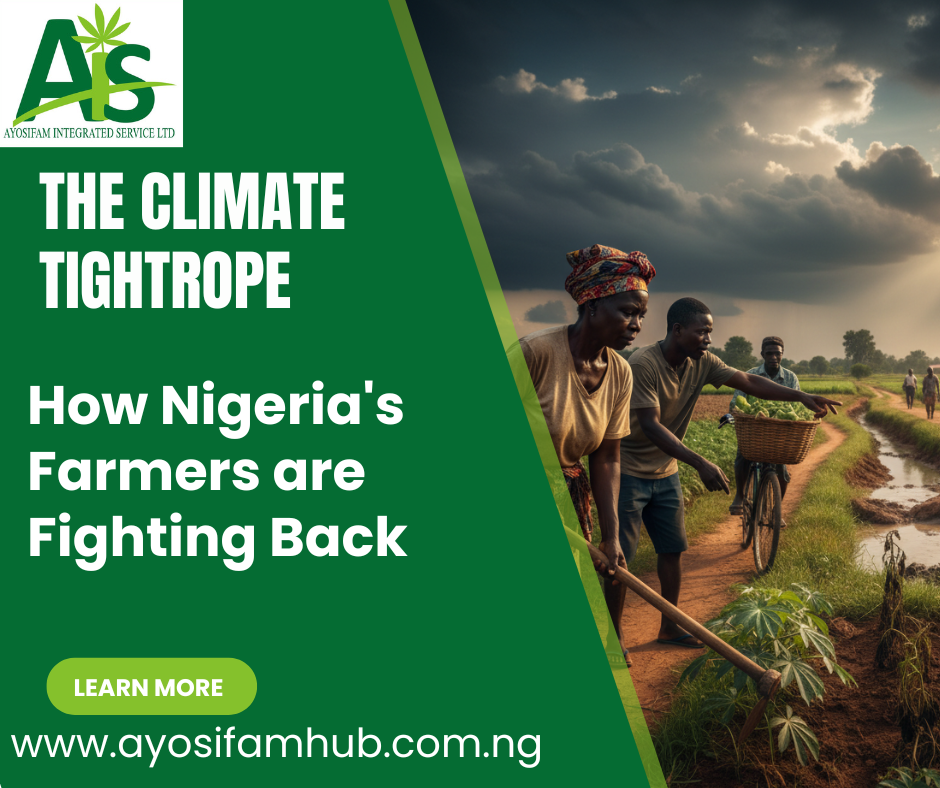Welcome to AyosifamHub!
Today, we’re diving deep into an issue that touches every plate, every pocket, and every family across Nigeria: climate change and its profound impact on our incredible smallholder farmers.
You’ve likely felt it – the searing heat that lasts a bit too long, the sudden, merciless downpours that turn streets into rivers, or the unpredictable dry spells that leave fields parched. This isn’t just “bad weather”; it’s the new normal, and it’s hitting the backbone of our food system: the hardworking men and women who cultivate our beloved cassava and potatoes.
Potato’s Plight, Cassava’s Challenge
Let’s talk about our staples.
Potatoes, often a dietary comfort, are facing a tough battle. They’re sensitive souls, these tubers, and the wild swings in rain and temperature are wreaking havoc. Imagine tending your potato patch, seeing the healthy green shoots, only for a sudden drought or flood to wipe out months of effort. That’s the reality for many. Studies are showing a significant drop in how suitable our climate is becoming for potatoes – a worrying sign for both farmers and consumers.
Cassava, on the other hand, has long been hailed as a climate-resilient champion. It’s tough, drought-tolerant, and grows in less-than-perfect soils. But even our resilient cassava is starting to feel the squeeze. Farmers are reporting:
-
Shrinking Yields: Despite its hardiness, unpredictable weather is leading to noticeable drops in cassava harvest.
-
New Pests, New Problems: Changing climates mean new pests and diseases are emerging, threatening crops that were once robust.
-
The Flood Factor: While drought-tolerant, cassava fields are easily destroyed by the intense, sudden floods we’re now experiencing, especially in the southern parts of Nigeria.
So, while cassava might be tougher, it’s not immune. Our farmers are walking a climate tightrope, trying to balance traditional knowledge with an increasingly unpredictable future.
Stories of Grit: How Farmers are Adapting
But here’s the powerful part of the story: our farmers are not just victims; they are innovators and fighters. They are adapting with incredible ingenuity:
-
Smart Seeds & Stronger Stems: Farmers are actively seeking out and planting improved crop varieties. Think of cassava strains that can shrug off drought better or resist new diseases. It’s about choosing seeds that are tough enough for the changing times.
-
Diversifying to Thrive: Many are wisely realizing that putting all their eggs (or yams!) in one basket is too risky. They’re diversifying their income by venturing into small businesses, trading, or crafts, creating a financial safety net when the weather turns against their crops.
-
Back to Basics, Better Methods: On their farms, you’ll see incredible changes:
-
Intercropping: Planting different crops together, like cassava with legumes, which can enrich the soil.
-
Mulching: Covering the soil to retain precious moisture and improve soil health.
-
Strategic Planting: Adjusting planting calendars, trying to outsmart the erratic rainy seasons, often based on generations of inherited wisdom combined with new climate forecasts.
-
These aren’t just farming techniques; they are acts of resilience.
Beyond the Farm: What This Means for All of Us
The struggles and triumphs of our smallholder farmers ripple across every facet of Nigerian life:
-
Empty Plates, Higher Prices: When crops fail, it means less food in the markets. And less food inevitably means higher prices. For the average Nigerian family, especially those on tight budgets, this means tougher choices at the market and a constant battle against food insecurity.
-
Economic Strain: Imagine losing your entire year’s harvest. That’s not just a bad season; it’s an economic disaster for a farming family. This creates widespread poverty and instability in rural communities, impacting everything from school fees to healthcare.
-
The Clash for Resources: In some regions, especially in the North and Middle Belt, extreme weather is drying up fertile land and water sources. This dwindling access to resources intensifies farmer-herder conflicts and tragically forces many people to leave their homes, becoming climate refugees in their own country.
-
Broken Roads, Broken Systems: Those intense, unpredictable rains aren’t just damaging farms. They’re destroying our roads, bridges, and homes, crippling our infrastructure. This makes it harder for everyone to travel, transport goods, and access essential services.
What Can We Do?
The story of climate change in Nigeria is complex, but it’s also a call to action. We can support our farmers by advocating for:
-
Better access to climate-resilient seeds and farming education.
-
Investment in sustainable irrigation and water management.
-
Policies that protect farmers and help them adapt.
-
Local initiatives that support diversification and innovation.




